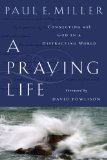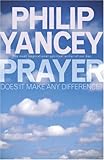 I must confess that after seeing that the endorsements for this book were all from Reformed theology professors, I feared that this book would be a rather dry but theologically precise exploration of the subject of prayer. I was completely wrong. This is a book about developing an intimate relationship with God through prayer.
I must confess that after seeing that the endorsements for this book were all from Reformed theology professors, I feared that this book would be a rather dry but theologically precise exploration of the subject of prayer. I was completely wrong. This is a book about developing an intimate relationship with God through prayer.
It is organised into 32 short chapters, making it an ideal format to work your way through in small chunks while you attempt to apply the insights to your own prayer life. Miller is very honest about the difficulties and struggles we find with prayer, which are largely because we have a dysfunctional relationship with our father, not intimate but distant. We struggle because we are focusing on praying, not on God.
He emphasises being real in prayer, coming “messy”, without pretence. He encourages us that it is OK to pray like a child – wander all over the place and ask for what you want.
Miller argues that Jesus was the most dependent person that ever lived. Because he can’t do life on his own, he prays. When Jesus prays, he is not performing a duty; he is getting close to his Father.
He devotes some chapters to issues of disappointment and cynicism. Throughout the book he tells stories of his own prayer life, particularly relating to his mute daughter Kim. It is full of very practical examples and advice for how to pray for others, culminating in some examples of his own system of “prayer cards” and journaling.
He has a lot of helpful material on living in your Father’s story, as we recognise that God is retelling the story of his Son in our lives. Gospel stories involve suffering; they are neither comedies (fun but not real) or tragedies (not fun but real), but are stories of hope.
Overall I would say this is an extremely refreshing and inspiring book on prayer. It is theologically sound, very real and honest, and has been very helpful for me as I am well aware I need to learn to pray better.

